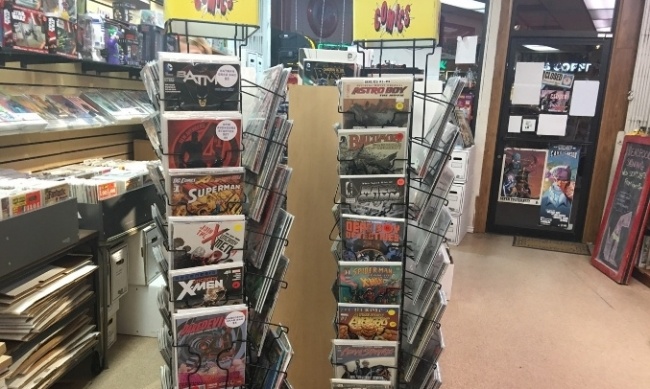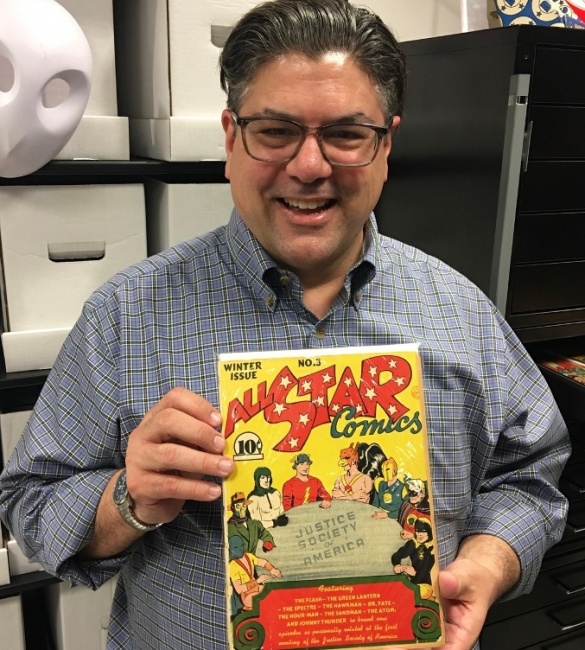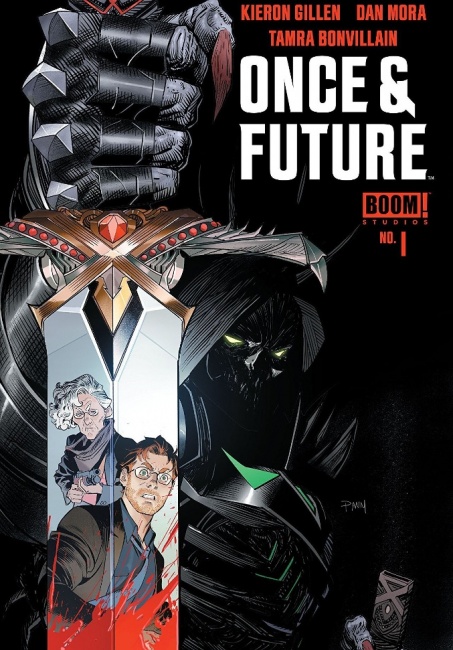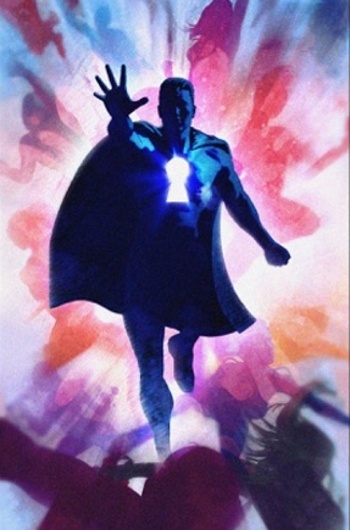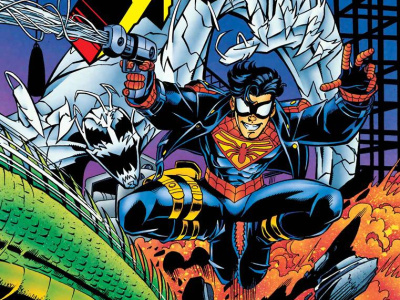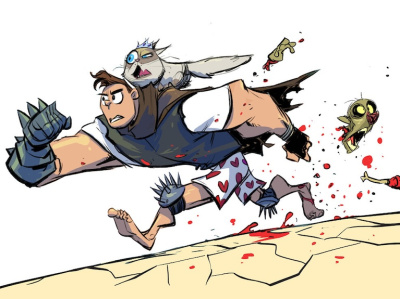It's said that everything old becomes new again, and now there are new ways to approach the old—back issues, that is.
Although there are a few rare exceptions, most all direct-market comic stores are back-issue stores as well. That piece of the pie seems to be growing, but in ways retailers really haven’t seen before.
"There is more activity in first appearances of characters, of maybe collecting specific artists or writers," Field continues. "But in terms of collecting things to have a complete collection… I really think the publishers have blown that market up by constant restarts and doing 'seasons' rather than long-running series."
The scene looks the same to Carr D’Angelo, who owns the two Earth-2 stores in Los Angeles.
"There's still that classic guy with his list out there, and he’s buying only the issues he needs to fill in his run, and I love that guy," D'Angelo says. "But I think there are more people buying back issues just because it brings them joy."
Sure enough, Earth-2 has a spinner rack that they load with $1, $3, and $5 bagged-and-boarded back issues (pictured above). They pay little attention to the price guide on these.
"Something might be a $10 comic in Overstreet, but we’re using simple price points to get people looking," D'Angelo says. "It's not going to break our bank, it's not going to break theirs. But if someone spots a fun Superman book or a goofy Lois Lane comic, they might buy it, not because they were looking for that specific issue, but because they just like the idea of this cool comic."
What D'Angelo calls "random" buyers are on the upswing. There's also a serious upswing in another kind of buyer.
"There is the return of speculators," D'Angelo says. "There are day-traders dedicated to the idea of flipping comics, literally flipping them in a day. They want to buy Once and Future from BOOM! Studios for $4 that day, and sell it for $10 on eBay that night. I dunno. You can't even buy lunch with what you made after eBay fees and all, but there are definitely those speculators."
D'Angelo calls it "comic book arbitrage," and other retailers have picked up on the term as well. Congrats, it's 1992 all over again, with lines out the door.
"We might have eight to 20 people waiting for us when we open on a Wednesday morning," Joe Field says. "Why are they waiting? Maybe they want first crack at the variants, or they wanna scoop up all the hot books for the week."
Pretty much any channel of retail trade should be happy to have people lined up on the sidewalk before they open. But it can be a sword that cuts both ways.
"What we've always done is managed our inventory in ways that thwarts speculation," Field says. "If you want to buy copious amounts of something, you’d better do it before our FOC deadline. You can't come in here and sweep everything off our shelves on a Wednesday morning because that’s unfair to the hundreds and hundreds of people who shop the rest of the week. There are limits to everything that goes on our racks, whether it's a hot speculated book or not."
And the "hot speculated book" is coming to you in a very 2019 way, usually on your smartphone and often through the Key Collector app. Key Collector launched in 2017, the brainchild of Nick Coglianese, who's been collecting comics off-and-on since he was 9 years old. Circa 2014 or so, Coglianese met a used bookseller who had a collection of 50,000 comics in a warehouse. Coglianese offered to help the bookseller sort through the collection, but found the process daunting.
"Going through this 50,000-book collection… I thought I knew a lot," Coglianese says. "I had been collecting for a quarter century. But a summer later, I was still down at the warehouse thinking 'Why isn't there a resource that's essentially the history of comics told through these key issues?' That's what I wanted to create."
Coglianese did, and took two-plus years to build a database of 17,000 key issues. He adds to the database and updates daily. Key Collector provides crazy-deep dives into comics, very much tied into the now. With the announcement of Marvel’s Shang-Chi movie, Key Collector provided "The Deadly Keys of Shang-Chi." As Spawn approached issue #300, Key Collector highlighted "Low Print Spawn" for people looking for the scarcest issues (Scoring at home? It's Spawn #243 at 11,714 copies).
Key Collector itself is a double-edged sword. Some retailers don't like it, as it seems to inspire arbitrage. On the other hand, a good informational tool (that drives sales)? That sounds like retail Heaven. Carr D'Angelo takes the middle path.
"I think information is neutral," he says. "It’s helpful for me. When I pick up a run of Incredible Hulk comics, #300-#400, it’s helpful to know, 'Which ones should I be looking for in this box?' But it’s also like reading Motley Fool or watching Mad Money. When everyone has access to the same buy/sell information, it intentionally or unintentionally changes the market. It's the experiment that’s being observed. If you tell everyone that Nova #1 is the next hot book… well, it can become the next hot book."
It can also be good to give the Johnny-come-lately arbitrage-ers a handy tool.
"I don't want to be doing your research," D'Angelo says. "We used to have a guy who would get our staff to start looking up stuff online for him, and I had to tell them, 'you can’t do that.' If he's buying the comic, sell him the comic. That's fine. But if he’s asking general questions because he doesn’t have the patience to look it up himself, we are not his classroom."
Coglianese agrees with the assessment.
"Comic books have been published over eight decades now," he says. "No matter if people are new, seasoned, or coming back into it after a while, giving them a strategy such as key issues… it's a good starting point. I see people getting excited over a $100 book, a $5 book, or a $1 book, because it's an accomplishment when they add it to their collection. They found it. It enhances their collection. It's the hunt. The more excited they are, the better."
Excitement comes in many forms. Joe Field sees many of the same "casual" buyers that D'Angelo does.
"We have a fair mount of people buying back issues from us who would not be considered 'comic book collectors,'" Field says. "There's a lot of curiosity factor. They come in and they've seen that Walking Dead TV show, so it’s, 'Let’s get a Walking Dead thing we can hang on the wall.' I have guys who come in here regularly who are looking for reasonably priced $15-and-under Silver and Bronze Age stuff that they can display on the walls in their offices. They're not what you'd call comic book collectors, but they like the pop culture curiosity of what they're buying. There's a lot of ways to be in the back-issue market, and if people are having fun with it, keep doing it."
For his part, D'Angelo sees treasure-seeking hardcores along with his $3 Lois Lane buyers.
"Some are deep-dive guys," D’Angelo says. "Immortal Hulk is a is a book that's got people more interested in Hulk history, so they want to know when did he become Professor Hulk, when did he become Gray Hulk, because all those things relate to the current Hulk story. Also, Donny Cates might make a reference to an obscure character from an old 90s Dr. Strange story, and all of a sudden, that old issue might shoot up. And that’s the fun of it for many people going through our back-issue stock—they’re hunting for the one thing that we didn’t catch yet."
And they find what to hunt for online.
"What's driving the back-issue market is all online, grass roots" Coglianese says. "It's Facebook groups, boards, Reddits. The audiences can get rabid. There's a guy named ‘Jim Comics’ who has a YouTube channel talking about new comics every week, and when he talks about something speculative, go look at eBay after he mentions it. You'll see, everything is cleaned out because he mentioned it."
That very word "speculative" is a dirty one to some retailers. But Coglianese thinks those people are fighting the wrong enemy.
"A lot of people shit on speculators, but I kind of look at the comic industry as this giant, three-pole tent," he says. "Your poles propping it up are the readers, the collectors, and the speculators. They're all contributing to the industry. They're all holding up their part of that tent. And if one goes… no one wants to see that. People might say, 'I hate speculators; I want to see them go away.' Well, if they went away, that's one big chunk of comics revenue that goes away with it."
He also thinks people are clutching at imaginary pearls.
"When people say, 'Oh, this is like the '90s all over again…' This is nothing like the ’90s," Coglianese says. "There were million-sellers then, not even close now. The print runs are a fraction of that. There's a global market for this material now. I think there's a healthy supply and demand now, without one outweighing the other. You can look at eBay sold listings for a month, and there’s millions of comics sold."
Casual readers, hardcores, a burgeoning market for ’90s nostalgia... all categories are up at Erath-2 Comics. Carr D'Angelo even sees a solid place for that full-run collector.
"When we buy a collection and there's an 80-issue run of Catwoman... I'd be dead before I sell them all individually," he says. "So we wrap them up and sell them as a run, and that's where people do buy runs. People really respond to that. Chunks are good."
And as is often the case, he with the largest warehouse wins.
"Yeah, I've got a warehouse with a fair amount of comics, and what I’m able to do is dip into it from time to time and pull some stuff to make it fresh in here," Joe Field says. "I think the back-issue buyers in our area know that we're going to have a good selection, and they're going to be reasonably priced, and there’s going to be a fairly good turnover. All that turns into 'Yeah, here's a stop we have to make.'"



